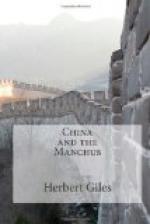The term “Triad” signifies the harmonious union of heaven (q.d. God), earth, and man; and members of the fraternity communicate to one another the fact of membership by pointing first up to the sky, then down to the ground, and last to their own hearts. The Society was called the Hung League, because all the members adopted Hung as a surname, a word which suggests the idea of a cataclysm. By a series of lucky chances the inner working of this Society became known about fifty years ago, when a mass of manuscripts containing the history of the Society, its ritual, oaths, and secret signs, together with an elaborate set of drawings of flags and other regalia, fell into the hands of the Dutch Government at Batavia. These documents, translated by Dr. G. Schlegel, disclose an extraordinary similarity in many respects between the working of Chinese lodges and the working of those which are more familiar to us as temples of the Ancient Order of Free and Accepted Masons. Such points of contact, however, as may be discoverable, are most probably mere coincidences; if not, and if, as is generally understood, the ritual of the European craft was concocted by Cagliostro, then it follows that he must have borrowed from the Chinese, and not the Chinese from him. The use of the square and compasses as symbols of moral rectitude, which forms such a striking feature of European masonry, finds no place in the ceremonial of the Triad Society, although recognized as such in Chinese literature from the days of Confucius, and still so employed in the every-day colloquial of China.
In 1816 Lord Amherst’s embassy reached Peking. Its object was to secure some sort of arrangement under which British merchants might carry on trade after a more satisfactory manner than had been the case hitherto. The old Co-hong, a system first established in 1720, under which certain Chinese merchants at Canton became responsible to the local authorities for the behaviour of the English merchants, and to the latter for all debts due to them, had been so complicated by various oppressive laws, that at one time the East India Company had threatened to stop all business. Lord Amherst, however, accomplished nothing in the direction of reform. From the date of his landing at Tientsin, he was persistently told that unless he agreed to perform the kotow, he could not possibly be permitted to an audience. It was probably his equally persistent refusal to do so—a ceremonial which had been excused by Ch`ien Lung in the case of Lord Macartney—that caused the Ministers to change their tactics, and to declare, on Lord Amherst’s arrival at the Summer Palace, tired and wayworn, that the Emperor wished to see him immediately. Not only had the presents, of which he was the bearer, not arrived at the palace, but he and his suite, among whom were Sir George Stanton, Dr Morrison, and Sir John Davids, had not received the trunks containing their uniforms. It was therefore impossible for the ambassador to




